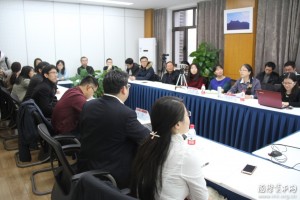Macro-Finance Salon (No. 42): Latest Changes in Offshore RMB Market and Hotspot Discussion
2016-11-20 IMI Mr. Ying elaborated Hong Kong offshore RMB market from the perspective of formation, challenges and opportunities, analyzed some hotspot issues regarding offshore RMB market and shared his views on the reasons and future trend of RMB depreciation. He pointed out that after the “8.11 reform”, offshore market demonstrated the following new features: offshore exchange rates fluctuations led to the upside down of onshore exchange rates, the widening CHY-CNY spread triggered cross border arbitrage and liquidity crunch caused the offered rate upside down. The market also showed several kinds of typical cross-border arbitrage and short selling. He mentioned that measures such as foreign exchange settlement and sale administration, outflow control, expectation management and international cooperation can be taken to respond to RMB fluctuation. He considered that Hong Kong RMB business is being challenged, bond issue turns bleak and RMB loan business is also influenced; meanwhile, RMB business faces important development opportunities: the opening of capital account brings opportunities of cross-border transaction, the RMB’s inclusion in the SDR stimulates the demand for RMB reserve and the establishment of free trade zones facilitates the outflow of wealth. He also shared his opinions on the RMB exchange rate arbitrage mechanism of capital account. As for the future trend of RMB, he stated although RMB was a little weak recently, it is by no means a weak currency. As China’s economy keeps a stable and continuous growth, RMB has no potential for significant depreciation.
Mr. Ying elaborated Hong Kong offshore RMB market from the perspective of formation, challenges and opportunities, analyzed some hotspot issues regarding offshore RMB market and shared his views on the reasons and future trend of RMB depreciation. He pointed out that after the “8.11 reform”, offshore market demonstrated the following new features: offshore exchange rates fluctuations led to the upside down of onshore exchange rates, the widening CHY-CNY spread triggered cross border arbitrage and liquidity crunch caused the offered rate upside down. The market also showed several kinds of typical cross-border arbitrage and short selling. He mentioned that measures such as foreign exchange settlement and sale administration, outflow control, expectation management and international cooperation can be taken to respond to RMB fluctuation. He considered that Hong Kong RMB business is being challenged, bond issue turns bleak and RMB loan business is also influenced; meanwhile, RMB business faces important development opportunities: the opening of capital account brings opportunities of cross-border transaction, the RMB’s inclusion in the SDR stimulates the demand for RMB reserve and the establishment of free trade zones facilitates the outflow of wealth. He also shared his opinions on the RMB exchange rate arbitrage mechanism of capital account. As for the future trend of RMB, he stated although RMB was a little weak recently, it is by no means a weak currency. As China’s economy keeps a stable and continuous growth, RMB has no potential for significant depreciation.
 Tu Yonghong, the deputy director of IMI, extended her gratitude to Ying Jian. She believed that Mr. Ying made his speech lively and explained complicated issues in a simple way. The speech not only talked about policy changes in the changing market and the original intention and effects of the policies, but also analyzed whether the policies delivered the expected outcomes and how to solve problems in RMB internationalization. The speech integrates theory with practice, delivering fruitful results.
Tu Yonghong, the deputy director of IMI, extended her gratitude to Ying Jian. She believed that Mr. Ying made his speech lively and explained complicated issues in a simple way. The speech not only talked about policy changes in the changing market and the original intention and effects of the policies, but also analyzed whether the policies delivered the expected outcomes and how to solve problems in RMB internationalization. The speech integrates theory with practice, delivering fruitful results.
 Wang Fang, the assistant dean and associate professor of School of Finance of RUC, expressed her views on capital and finance account in RMB internationalization. Both Prof. Tu and Prof. Wang said the case of Hong Kong offshore RMB market fluctuation after “8.11 reform” is a very good case to study for students.
Wang Fang, the assistant dean and associate professor of School of Finance of RUC, expressed her views on capital and finance account in RMB internationalization. Both Prof. Tu and Prof. Wang said the case of Hong Kong offshore RMB market fluctuation after “8.11 reform” is a very good case to study for students.

